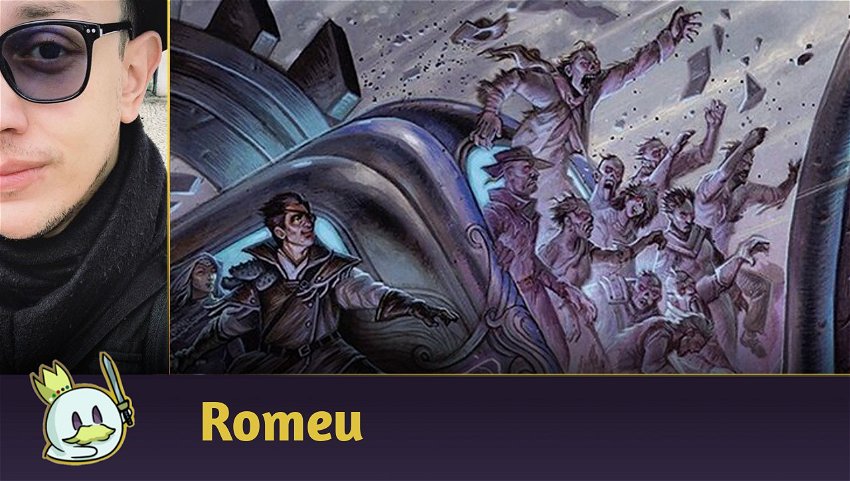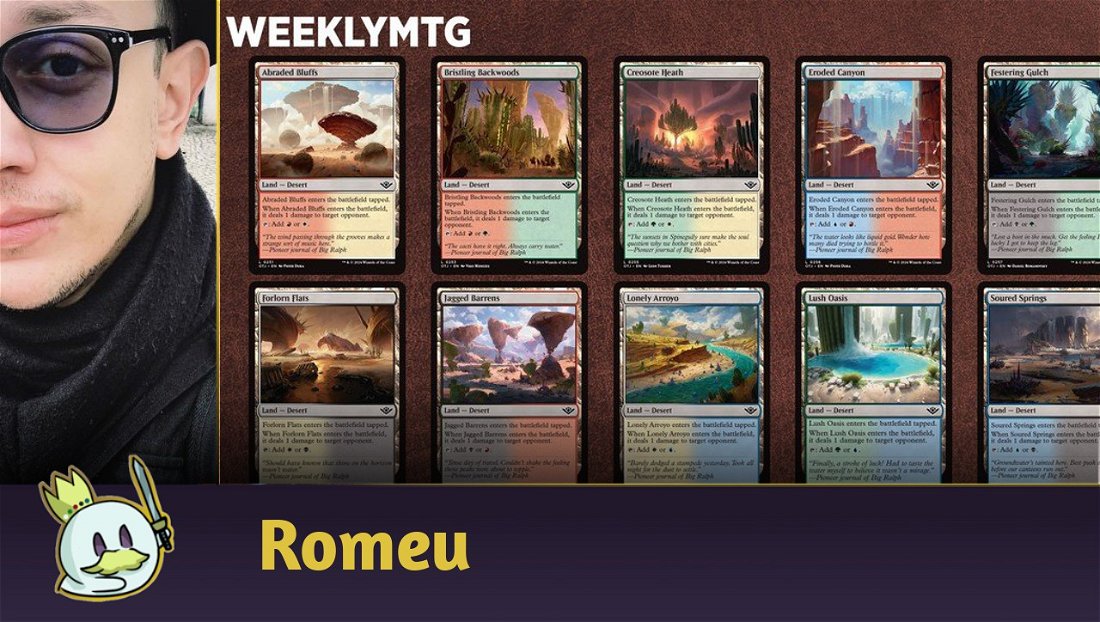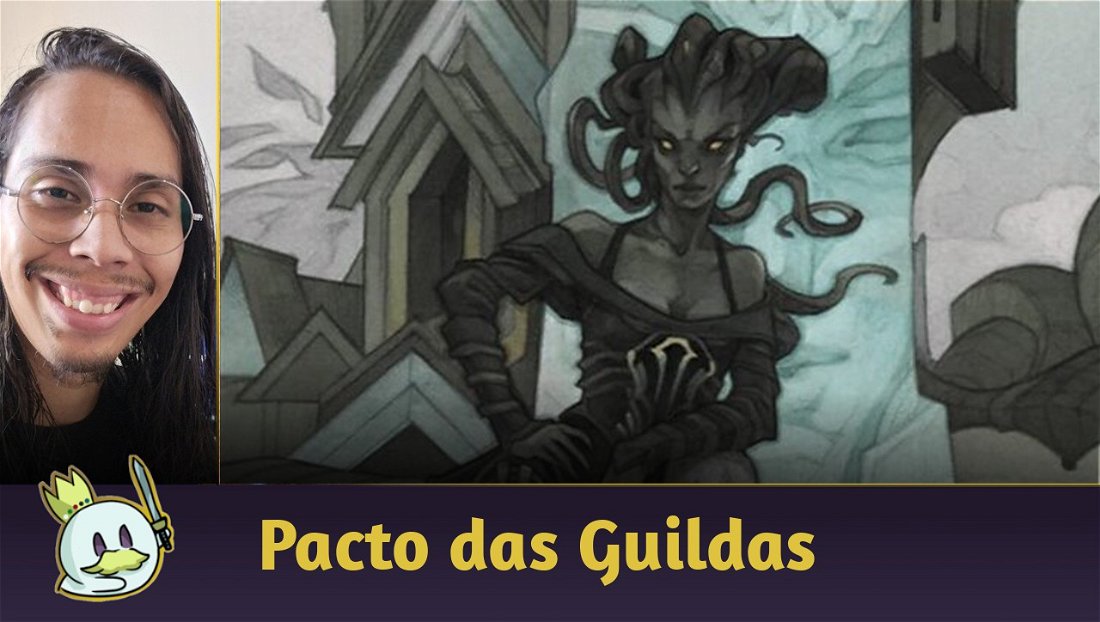With each new expansion, the emergence of potential two-card combos for competitive formats seems to grow and become more frequent. While some won't affect the Metagame due to their deckbuilding concessions, others quickly climb to the top of the competitive scene, as was the case with Amalia Benavides Aguirre at Pioneer.
Magic's next release, Outlaws of Thunder Junction, brings another powerful two-card interaction, capable of winning games instantly - and not only for the Pioneer, but also for Standard with the newly revealed Rush of Dread!
Ad
Check out, in this article, the first impressions of this new combo, how it works and its potential for competitive formats!
How does the Rush of Dread combo work?

Rush of Dread is one of the most unique and powerful cards the new set has brought so far, being reminiscent of effects like Rankle's Prank or Smallpox but completely asymmetrical, where only the opponent suffers from its effects, making it a versatile and efficient tool in Midrange mirrors.
Its combo potential, however, is in its third text line, where the target opponent loses half of their life rounded up. Alongside effects to double life loss and/or cause the opponent to lose life equal to the total they have already lost in the turn, it creates a “combo-kill” similar to what we saw with Sanguine Bond and Blood Tribute back in the Alara-Zendikar Standard.

Today, Standard has one of the most cost-effective and body-efficient “doubling life loss” effects in the game's history - and by intention or convenience, both effects curve perfectly into each other, almost as if they were inserted into different sets on the same cycle on purpose.
With Bloodletter of Aclazotz in play, its ability makes Rush of Dread the opponent lose double half their life, rounded up. In other words, if your opponent has 15 life, instead of losing 8, they will lose 16 - an immediate win, whose only response window is at the moment we cast the spell, as Bloodletter's ability is a replacement effect.
At a viable mana cost for both pieces on a decent mana curve, while both cards are useful enough on their own, it's possible we're in a new situation where a Midrange-Combo hybrid might gain a spotlight in the competitive scene.

The closest to this combo that I can imagine as valid in the current Metagame is the interaction between Archfiend of the Dross with Metamorphic Alteration, where turning an opponent's creature into a copy of Archfiend makes them lose the game at their next upkeep.
Archfiend of the Dross is a stronger creature in a vacuum and a more impactful win condition than Bloodletter of Aclazotz, although the latter has more room for micro-interactions with damage or life loss effects, but Rush of Dread is a much more useful card than Metamorphic Alteration despite its low cost, rarely being a bad topdeck while improving as the game goes on.
Rush of Dread on Standard
Standard is an interesting spot for this interaction, but it doesn't seem like an instant addition for the same reasons to why the combo between Ob Nixilis, Captive Kingpin and All Will be One doesn't make it to in the competitive Metagame: both pieces require specific sequencing to work and are not as impactful on their own - although Rush of Dread is better than All Will be One on occasions outside the combo, in addition to Ob Nixilis requiring some means the opponent lose life and/or takes damage to start the loop, while Bloodletter of Aclazotz works on its own.
Ad

Being the main competitive deck in Standard today, Dimir Midrange could make some concessions to include the combo, especially if it is not forced to use multiple copies of it when having Insatiable Avarice as an efficient tutor.
Bloodletter of Aclazotz helps in boosting the clock of small threats on the list, but could end up competing for space in the four-drop slots, especially considering Rush of Dread as a five-mana spell.
In the end, the combo could demand too much space for Dimir Midrange to the point of hindering its game plan, and the competition of its key pieces with Sheoldred and Ertai Resurrected doesn't put them advantaged.

A more Control-oriented version could also work, but it suffers from excessive interaction if it is your only win condition. After all, this is an easy combo to telegraph and only requires a removal spell against Bloodletter of Aclazotz to fail.
In an environment without Dispel or other more efficient low-cost protections, it becomes more difficult to protect the demon and apply the combo at the right time without having to extend the game to the point of closing it in a single turn for nine mana, or create a huge setup of counterspells before casting one of the pieces.

Perhaps, more proactive versions are the solution for the combo to find a home, but just like in Dimir Midrange, Bloodletter of Aclazotz continues to compete with Sheoldred, the Apocalypse and/or other cards whose individual value is very more impactful, like Gix's Command.
Rush of Dread on Pioneer
Rush of Dread and its combo suffer from similar problems in Pioneer: how much more efficient are these two cards for the format's current black Midranges, and how can we take advantage of their abilities?
Would a new Rakdos Sacrifice variant be viable, since both cards feed its clock and the combination of the new spell's creature sacrificing module with Mayhem Devil is potentially devastating? How much better and more consistent at winning games is Bloodletter of Aclazotz when compared to Sorin, Imperious Bloodlord and Vein Ripper? Does the fact that it gets a kill against Abzan Amalia regardless of how much life the opponent has gained make a difference in this equation?
Despite its pros and cons and the need to consider them in comparison with other combos in the format, this one has a potential as great as or even greater than Archfiend of the Dross and Metamorphic Alteration, as well as being a great opportunity to revisit an old archetype - Mono Black Devotion.
When Bloodletter of Aclazotz was released, players tried to bring Devotion back with little to no success. After all, its inherent flaws remain, and the limitations between maintaining a full battlefield and taking advantage of extra mana while interacting with the opponent's board is a challenge that often makes the deck too fair for the Metagame.
Ad
Now, with Rush of Dread, Mono Black Devotion gains a more unfair game approach, and the addition of Nykthos, Shrine to Nyx makes it possible to eventually reach the nine mana needed to close the combo in a single turn.

In addition to the combo, the devotion package adds even more consistency in reaching your win conditions: Warlock Class offers a devotion point, works as card selection and the last ability interacts with Rush of Dread to win the game while dodging the removals that would commonly deal with Bloodletter.
The extra mana can also be used to pay for several modules of Insatiable Avarice, allowing to maintain card advantage while searching for one of the remaining pieces.

Gray Merchant of Asphodel remains the main reward for the Devotion package alongside Nykthos, Shrine to Nyx. With only it and Bloodletter of Aclazotz, the opponent already loses ten life, but as it requires more concessions and is not as relevant on its own, in addition to the consistency added by the combo, its numbers have gone down and can even reach zero if necessary.
Conclusion
That's all for today!
If you have any questions or suggestions, feel free to leave a comment!
Thanks for reading!








— Comments0
Be the first to comment